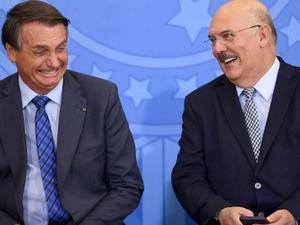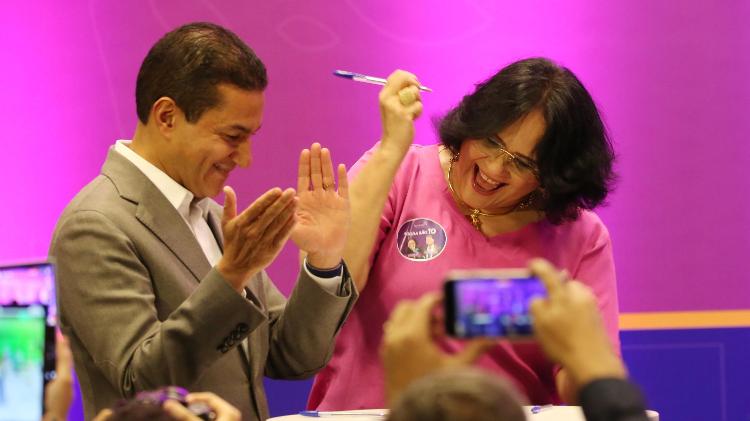The departure of Presbyterian pastor Milton Ribeiro as head of MEC (Ministry of Education) last Monday (28) has not changed the strong presence of so-called historic Protestantism representatives in different parts of Jair Bolsonaro (PL) government. They occupy strategic positions in the three Powers, even if they have no previous experience.
Historical or traditional evangelicals are Presbyterians, Baptists, Methodists, and Anglicans. They are described as people with more technical, cautious profiles and lack the media appeal of the Pentecostal and Neo-Pentecostal Protestant churches – linked to the Assembly of God, for example.
Focusing on the defense of customs rules, the traditional group of evangelicals eventually created a network of indicators that aided ideological cheating in government. For example, Ribeiro expressed interest in having access to Enem to avoid “issues of an ideological nature.”
Fábio Py, a PhD in theology from PUC-Rio, describes the group as “the most intellectualized”. “Traditional Protestants are taking over the more technical fields because there is a long history of educational training among evangelicals,” said an article on IHU’s (Instituto Humanitas Unisinos) website.
For the political scientist Marco Antonio Carvalho TeixeiraAs a professor of public administration at the FGV (Fundação Getulio Vargas), it is important to note that evangelicals are heterogeneous within their group.
“Risk [de ter evangélicos no governo] it happens when people lose the dimension that religion is in the realm of intimacy and privacy, and acting in government is in the realm of the public interest,” says Teixeira.
Especially when we see a discussion about Enem questions like what happened at Inep last year, the risk comes up.”
Marco Antonio Carvalho Teixeira, political scientist
Evangelicals at MEC
In his education portfolio, Ribeiro was the second to be appointed to a prominent position with Universidade Presbiteriana Mackenzie.
Months ago, Mackenzie’s then-dean and creationism advocate Benedito Guimarães Aguiar Neto was appointed head of Capes (Coordination for the Improvement of Higher Education Staff), an MEC-affiliated body active in graduate studies.
Aguiar Neto replaced Anderson Ribeiro Correia, who was nominated by evangelicals affiliated with the Baptist Church and close to Bolsonaro.
“A large proportion of neoconservative religious activists, particularly evangelicals, are Mackenzie-trained or professors and researchers, who have even provided technical and ideological staff to the federal government,” says João Luiz Moura, a religious studies scholar and researcher at Iser. (Institute of Religious Studies).
According to Moura, there is a network of indicators that operate at the ideological level and promote issues of religious conservatism in schools and universities.
“Therefore, in order to maintain this organic functioning that affects institutional dynamics, new activists must be mobilized directly in Education, in the ideological formation,” says the researcher.
Ribeiro’s administration at the MEC brought other names to the portfolio associated with historical Protestantism. Danilo Dupas, president of INEP (National Institute of Educational Research and Research), took a prominent position in Ribeiro’s management. Even during the organ’s worst crisis, Enem on the eve of 2021 put then-minister Dupas in charge of Inep.
according to the calculation UOLIt was the ties established at Mackenzie between Dupas and Ribeiro that did not lead to the dismissal of the Inep president.
Also part of the nomination network: Carlos Decotelli, another member of the Presbyterian Church, who spent just a week at the MEC before resigning when allegations of irregularities in the Lattes curriculum surfaced.
Some names of traditional evangelicals who have passed or been in government
- André Mendonça, current minister of the Federal Supreme Court (STF), former attorney general of the Union and Presbyterian;
- Benedito Guimarães Aguiar Neto, former president of Capes and Presbyterian;
- Carlos Decotelli, former Minister of Education and Presbyterian;
- Baptist Damares Alves, Minister for Women, Family and Human Rights;
- Danilo Dupas, president of Inep and a Presbyterian;
- Fábio Faria, Minister of Communications and Baptist;
- Milton Ribeiro, former Minister of Education and Presbyterian;
- Sandra Lima de Vasconcelos Ramos, teaching materials coordinator at MEC and Baptist;
- Onyx Lorenzoni, Minister for the Civic Assembly and Baptist.
Three Powers
In addition to the MEC, there are other Presbyterians and Baptists who occupy strategic positions in Bolsonaro’s government. Former Minister of Women, Family and Human Rights Damares Alves is pastor at Lagoinha Baptist Church.
Damares made statements regarding his conservatism agenda on the day he formalized his departure from the ministry. “As a controversial minister, I could not help but say: Children belong to the family, boys wear blue, girls wear pink. The family is responsible for the children,” the minister of the time said.
André Mendonça, STF minister affiliated with the Presbyterian church, is also one of the major evangelical figures who went through government as Union Prosecutor and Minister of Justice. He has been called a “horribly evangelical” name for the Supreme Court by Bolsonaro.
On the day Mendonça was admitted to the court, First Lady Michelle Bolsonaro gave a very emotional celebration. They jump and pray together in a video posted on social media.
Regarding Mendonça’s presidency at the STF, the FGV professor claims “there hasn’t been a big debate yet” involving conservative agendas that Bolsonarism loves.
There is an evangelical tribune in Congress, and the group is not homogeneous and has internal disagreements as in other areas of government.
The Evangelical Parliamentary Front currently has 184 members, 178 deputies and 6 senators. Despite the name, not all are Evangelicals: there are 78 Catholics, 3 Spiritualists, 1 irreligious, and 11 more who have not stated their doctrines. The data were compiled by Iser through opinion polls in the House of Representatives and the Federal Senate.
In the report, MEC and Secom (Federal Government Communications Department) were asked to comment on the presence of the Bolsonaro-led protesters, but no demonstrations took place. The field is open for updates.
2022 elections
Bolsonaro is seeking re-election as many currents and churches as possible, including Pentecostal evangelicals. “It is no coincidence that he has changed his speech in recent days to gain the support of the most ideological groups, including evangelicals,” Teixeira said.
Earlier last month, the Chief Executive Officer even said that during an action organized by evangelical leaders, he was leading Brazil where the priests wanted.
“It would have been so easy to be on the other side. But because I believe in God, we wouldn’t be chosen if I were on the other side.
According to the political scientist, the support of these groups is important not only for Bolsonaro, but also for other candidates. “It’s no coincidence that the PT formed its evangelical core, there are pastors who eventually try to work and lessen Bolsonaro’s weight on this electorate.”
Pastors’ involvement in MEC investigated
On April 25, the Federal Police launched two investigations to investigate the role of two non-public ministers, as well as then-minister Milton, in the release of MEC funds, as disclosed by the newspaper O Estado de S. Paulo. Ribeiro — Caught in an audio recording released by Folha de S.
In his statement to the Federal Police last Thursday (31), the former minister said he had received the priests at Bolsonaro’s request, but refused “preferential treatment”.
Bolsonaro’s government began on January 1, 2019, with the inauguration of President Jair Bolsonaro (later in PSL) and vice-president General Hamilton Mourão (PRTB). During his tenure, Bolsonaro left the PSL and remained partyless. The participation of ministries in the army is high. Bolsonaro positions his political alliance among conservatives on the right and in tradition.
source: Noticias
Mark Jones is a world traveler and journalist for News Rebeat. With a curious mind and a love of adventure, Mark brings a unique perspective to the latest global events and provides in-depth and thought-provoking coverage of the world at large.

